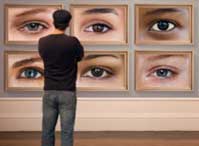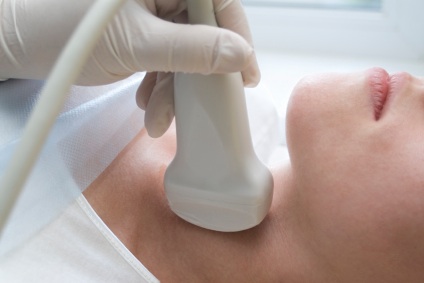Located in your neck, your thyroid is a gland that produces hormones that regulate your metabolism and energy levels. The thyroid disorders hyperthyroidism and hypothyroidism are caused, respectively, by an over- or under-production of thyroid hormone. Thyroid disorders are fairly common and often missed, because in mild cases their symptoms can be subtle or mistaken for other conditions.
Thyroid glands may also develop lumps or growths. Most of the time, these lumps are associated with normal thryoid levels, although occasionally, the thyroid hormone level can be too high or too low. Most of these growths are benign, but they can be cancers too, so it is important to have thyroid growths properly diagnosed.
Thyroid hormone abnormalities:
Healthy thyroid function is expressed as a range with levels either below or above the norm considered evidence of thyroid disorder. When symptoms are present but clinical findings are marginally within range, treatment may still be warranted.
Hypothyroidism
An underactive thyroid is particularly common in women over the age of 40. Symptoms of hypothyroidism include:
- Weight gain
- Fatigue
- Heavy menstrual periods (if premenopausal)
- Dry skin and hair
- Constipation
- Mental sluggishness
- Feeling cold
If hypothyroidism is suspected, a simple blood test can confirm its presence. One of the most common causes of hypothyroidism is Hashimoto’s Syndrome, an immune disorder in which the body mistakenly attacks the thyroid gland, eventually causing the thyroid to stop functioning. Other causes of hypothyroidism are overexposure to iodine from certain medications, radiation treatment, physical defect, or a pituitary disorder. Very rarely, cancerous thyroid nodules may be responsible.
Treatment for hypothyroidism consists of taking either a pharmaceutical or bioidentical version of thyroid hormone to boost (or replace) your naturally occurring levels. Blood tests are used to confirm that your levels are restored to a healthier range but ultimately, cessation of symptoms provides conclusive proof. Thyroid hormone must be taken for life to maintain its effect.
Hyperthyroidism
An overactive thyroid produces an entirely different set of symptoms:
- Jitteriness
- Irritability
- Weight loss
- Heart palpitations and the sense that your heart is racing
- Feeling hot
- More frequent bowel movements
- Shorter and lighter menstrual periods (if premenopausal)
The most common cause of hyperthyroidism is Graves’ Disease, an autoimmune disorder that causes overstimulation of the thyroid gland. Sufferers from Graves’ Disease sometimes have additional eye symptoms such as vision problems, bulging eyes, and eye irritation. As with hypothyroidism, a blood test can usually confirm the condition once it’s suspected.
Treatment for hyperthyroidism can take several routes. The most popular treatment is radioactive iodine. Because the thyroid is the only organ that takes up iodine, radioactive iodine can be administered to destroy part of the thyroid gland without damaging surrounding tissues. Occasionally this treatment can result in a new problem, hypothyroidism, which is treated with medication as detailed above.
Medications to slow down thyroid function are another option. These drugs are usually taken for six months to a year and a majority of patients will see their symptoms return when the medications are stopped.
The final option for restoring a hyperactive thyroid to normal levels is surgical removal of a part of the gland.
If you suspect you have either hypothyroidism or hyperthyroidism, Dr. Yagoda of Manhattan/ New York City (NYC) can diagnose your condition and determine an appropriate course of treatment for you.
Thyroid Gland Lumps and Nodules
Thyroid nodules or lumps are diagnosed by a compliment of tests that each contribute some information to allow the physician to determine if the lump is more likely benign or more likely to exhibit uncertain behavior. For example, the thyroid blood test is performed first. Usually, the hormones are in normal range. If so, it does not provide much information; however, if the hormone levels are elevated, it will more likely suggest a benign condition in the thyroid nodule.
The next test is a thyroid ultrasound to help to determine if the thyroid lump is solid or cystic. While cystic nodules are more likely to be benign, they are not always so. Solid ones exhibit more uncertain behavior.
Next, a fine needle aspiration biopsy (perhaps ultrasound-guided) is performed after the skin overlying the lump is numbed with a topical anesthetic. A tiny needle is inserted through the skin and into the lump to remove some of the cells from the nodule. The cells are evaluated under a microscope. Certain findings will provide information that the lump is likely to be benign and others will indicate that the pathology is uncertain. Rarely, the biospy will indicate cancer in the cells. Typically, the whole architecture of the nodule (not just the individual cells) is necessary to determine whether the nodule is a cancer.
Finally, a thryoid scan is used to evaluate whether the cells in the lump are more or less likely to be functioning endocrinologically. Radioactive material is injected into the veins, and it is concentrated in the thyroid gland. If the lump concentrates the material, it is called “hot” and shows that the nodule is active, which suggests that the nodule is more likely to be benign. On the other hand, if the nodule does not concentrate the radioactive material, it is called “cold” and is more likely to be a cancer.
All of this information, together with your age and gender, will help Dr. Yagoda determine whether the nodule is likely to be of concern. At times, surgery is necessary to make a definitive diagnosis. Once the diagnosis is confirmed, Dr. Yagoda will discuss the surgical or radiation options for treatment with you from her Manhattan and New York City (NYC) office.



































